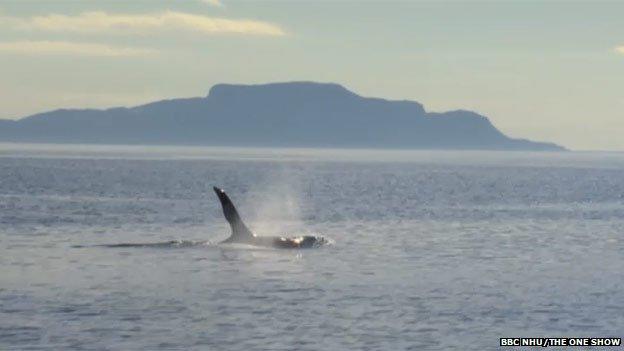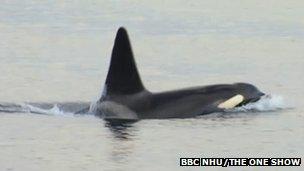'Extinction threat' for UK orcas
- Published

One of four killer whales filmed for the BBC's The One Show
The UK's only known resident population of killer whales is at risk of becoming extinct, marine life experts fear.
The group, which ranges from the north and west coast of Scotland to Ireland's west coast, is thought to contain just nine older animals.
The Hebridean Whale and Dolphin Trust (HWDT) said the group was at risk as a result of the "skewed" demographics.
The One Show is set to broadcast the last of a series of three features on the killer whales on Wednesday.
Presenter Mike Dilger and his crew were able to track down the group with help from Dr Andy Foote, a scientist who is studying genetics and genomics of killer whales at the Natural History Museum of Denmark.
Dr Foote has been carrying out collaborative research work with HWDT.
The trust's biodiversity officer Olivia Harries said the studies suggested the killer whales had become isolated from other groups in the north east Atlantic.

The killer whale group is aged and dominated by males
She said: "The group demographics are highly skewed to older individuals and there is an unusually high ratio of adult males.
"Recruitment is therefore unlikely and the females are probably post-reproductive.
"This means that these killer whales are due to go extinct in our lifetime."
In Tuesday's programme, Mr Dilger said three different groups of killer whales visit UK waters.
However, the Scottish population is the only one which remained all year round.
He added: "With just nine individuals and a home range stretching from the Outer Hebrides to Galway on the west of Ireland, to find them at all is simply astounding."
Mr Dilger said the group comprised of five females and four males.
He said: "They haven't had a calf, or baby, for 20 years.
"It is thought killer whales are one of the few animals that goes through the female menopause and they might be too old and past breeding potential.
"So in our lifetime they could die out."
- Published8 June 2012
- Published23 May 2012
- Published29 November 2011
- Published21 July 2011